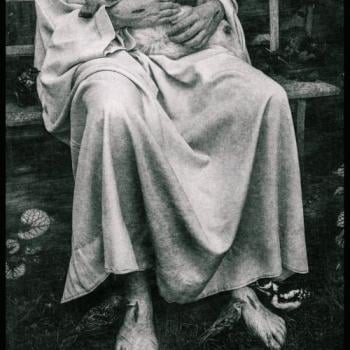I have occasionally heard other Hellenics refer to Dionysos as a "Gateway God," i.e. the God that first attracted them and drew them into Hellenic polytheism. Why do you think that He is so popular/attractive/intoxication . . . maybe approachable is the right word?
Oh, he definitely has that function and it's something I address several times in the book. I think one of the reasons may be that because he is partly human himself he understands us a little better than his fellow gods—what makes us tick, what our needs are, what gets our attention. So he can slip through our defenses and awaken us to the wider world around us.
He's also a very generous god who loves his family; his myths are filled with accounts of him coming to the aid of other Olympians, raising mortals up to divine status, building temples, introducing cults and serving other gods in a priestly capacity. That's a pretty extraordinary thing when you think about it; most Greek gods are eager to elevate their own dignity and thus are not inclined to humble themselves in the service of others. So really what a lot of people recount today—Dionysos coming into their lives merely to turn them over to another deity—is sort of an extension of that ancient tradition. Plus, well, Dionysos is sexy, exciting, mysterious, dangerous, so it's not a huge surprise that he's great at getting our attention.
Wine is so associated with Dionysos as His sacred drink. How would you suggest that someone in recovery navigate this? How ought they to adequately engage with this God and His sacraments when they are barred from that which is His most sacred?
Dionysos is a god of many masks. So while he is unquestionably the wine-god—meaning not only the giver of wine, but one whose spirit is in every glass we drink—that doesn't even begin to exhaust the totality of his being. He is the god of the dramatic arts, lord of healing, prophecy, and poetry, the bringer of fertility and abundant life for all plants and animals; he presides over kingship, rules a portion of the dead, guides youths into adulthood, and blurs all gender and social distinctions.
There are a great many other things that fall under his dominion, none of which need involve alcohol and other intoxicating substances. In fact, one of his supreme roles is as the Liberator who helps us break the bonds that hold us back from living a free and authentic existence. Addiction is the complete antithesis of freedom so I think that Dionysos has a lot to offer those in recovery and his methods could prove a lot more successful than conventional treatments, which mostly deal with the symptoms but leave the root cause of the ailment untouched.
Discipline, moderation, and respect for these substances as inherently holy things are as much a part of Dionysos's gifts to humanity as license and glorious excess. After all it was Dionysos who first taught us to water our wine and drink in a civilized, symposiatic fashion, eschewing the dangerous consequences of overindulgence. And the Orphics were complete teetotalers and vegetarians, except on certain ritual occasions. So no, one does not have to be a drinker to be a Dionysian. They must have respect for his gifts and I would recommend offering a token amount of wine even if the person never tastes it since wine is sacred to him and sacrifice is about offering what is pleasing to the gods, irrespective of our own preferences. But if a person felt that that was too much and might endanger their hard-won sobriety they could always substitute grape-juice or make offerings of other appropriate fruits, foods, smelly things, art, music, and the like.
I know from reading your blog that as part of your ongoing service to Dionysos, you provide public divination. Until reading your blog, I wasn't aware that divination was associated with Dionysos as one of His sacred arts. How did your public work in this sphere come about?
First I think it's important to make the distinction—recognized by the ancient Greeks—between divination through mechanical means and oracles, which are a form of direct communication with a deity. One is not more important or useful than the other, nor does divination through cards, stones, animal signs, and the like preclude receiving inspired messages from the gods—quite the contrary in fact!—but it's important to keep in mind that they aren't the same thing.
Yes, as a diviner myself, I quite agree.
Historically, mechanical divination tended to be associated with and conducted under the auspices of deities such as Hermes, the Nymphai, Hekate, Helios, Selene, and to some extent Apollon who was also the oracular god par excellence. There were a variety of different methods employed in antiquity, one of the most famous involving knuckle-bones or dice, which was said to be given to Hermes by Apollon in exchange for a tortoise-shell lyre—a bargain that served to reconcile the two after the trickster's theft of his sacred cattle.





